Introduction to Background Checks – Should You Do It Yourself or Use a Provider?
When it comes to hiring employees, performing background checks is an essential step in the hiring process. A background check helps employers confirm an applicant’s history, verify their qualifications, and ensure they are trustworthy and reliable. There are several types of background checks, such as criminal record checks, credit reports, and employment history verification, which provide key insights into a candidate’s past and can significantly impact hiring decisions.
When it comes to conducting a background check, employers have two main options: doing it themselves or utilizing an online background check provider. Both approaches come with their own set of advantages and disadvantages, which we will explore in this article. Understanding the key differences can help you make an informed decision on how to proceed with background checks for your hiring process.
Types of Background Checks
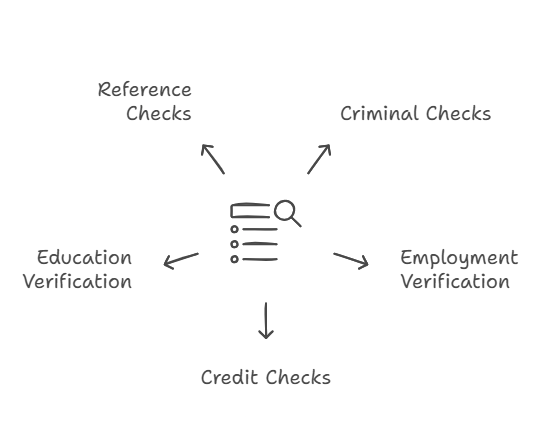
Background checks typically include:
- Criminal Background Checks: Verifying whether an applicant has a criminal record.
- Employment History Verification: Confirming past employment details, job titles, and duration of employment.
- Credit Report Checks: Assessing financial responsibility, particularly for roles involving financial transactions or sensitive information.
- Education Verification: Confirming the candidate’s educational qualifications and degrees.
- Reference Checks: Contacting previous employers or personal references for additional insights.
These checks are crucial in determining whether a candidate is a good fit for a role, ensuring that they meet job requirements and pose no potential risks to the organization.
Do It Yourself vs. Using a Provider
When deciding between conducting background checks yourself or using an online provider, it’s important to consider the benefits and drawbacks of each approach.
Pros and Cons Table
| Self-Conducted Checks | Using an Online Provider (e.g., RapidhireSolutions) |
|---|---|
| ✔ More control over the process | ✔ Faster processing time (24 hours) |
| ❌ Can be time-consuming and error-prone | ✔ Expert handling of legal compliance |
| ❌ Time-consuming and error-prone | ✔ Access to more comprehensive databases |
| ❌ May not comply with all legal regulations | ✔ Enhanced security and privacy protections |
As you can see, conducting background checks yourself offers the advantage of having more control over the process, but this comes at the cost of being time-consuming and prone to potential errors. Moreover, ensuring compliance with legal regulations can be a challenge when doing it on your own. On the other hand, using a professional online provider like RapidhireSolutions ensures a much faster turnaround time, compliance with legal standards, and access to more thorough databases.
Why Consider an Online Background Check Provider?
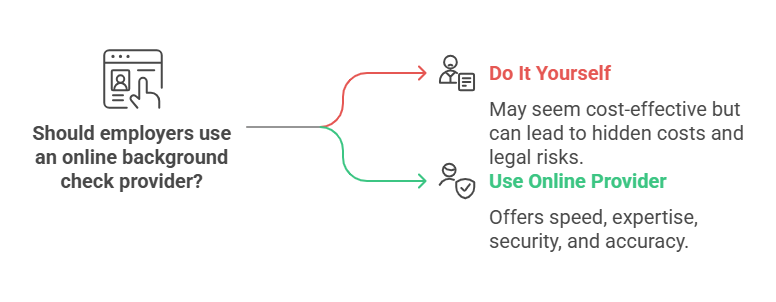
Although doing background checks yourself can appear to be cost-effective at first, it can lead to hidden costs in the form of time spent, potential legal risks, and the possibility of missing out on critical information. Professional background check providers, such as RapidhireSolutions, are equipped with the tools, resources, and expertise to conduct checks efficiently, comprehensively, and legally.
By using an online provider, employers benefit from:
- Speed: Results are often available in as little as 24 hours, making the hiring process much faster.
- Expertise: Providers like RapidhireSolutions have deep knowledge of compliance requirements and legal regulations.
- Security: Handling sensitive candidate data securely is crucial, and online providers are better equipped to ensure that this data is protected.
- Accuracy: Professional providers have access to comprehensive databases, ensuring that all aspects of a candidate’s background are verified.
In summary, while it’s possible to conduct background checks on your own, outsourcing the process to a reliable provider like RapidhireSolutions offers a higher level of accuracy, legal protection, and speed that would be difficult to replicate independently.
Conducting Background Checks Yourself vs. Using an Online Background Check Provider
When deciding how to conduct background checks for potential employees, employers face two primary options: conducting the checks independently or utilizing a professional online background check provider. Each option has its own set of advantages and challenges. While some businesses may consider doing background checks themselves to save costs or maintain more control over the process, others might prefer to delegate this task to a trusted provider to ensure a faster, more efficient, and legally compliant process. Let’s explore these two options in greater detail.
The Advantages of Using an Online Provider
Using an online background check provider such as RapidhireSolutions brings several key benefits that can streamline the hiring process and reduce potential risks. These include:
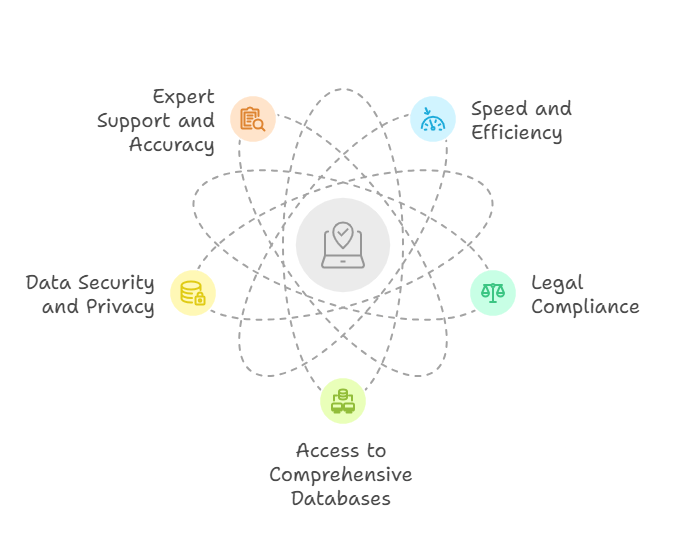
1. Speed and Efficiency
A major advantage of using an online provider is the speed of processing. Professional services can typically deliver results in as little as 24 hours, whereas self-conducted background checks can take several days, weeks, or even longer depending on the complexity of the search.
2. Legal Compliance
Legal compliance is another area where online providers excel. Professional background check companies are well-versed in the Fair Credit Reporting Act (FCRA), the General Data Protection Regulation (GDPR), and various state and federal laws governing background checks. Failing to adhere to these regulations could result in costly lawsuits or fines. Online providers ensure that all checks are done legally, protecting employers from potential legal pitfalls.
3. Access to Comprehensive Databases
Professional background check providers have access to vast and comprehensive databases that are often unavailable to the general public. These databases cover various aspects of a candidate’s history, including criminal records, employment history, credit reports, and more. The breadth and depth of these databases enable providers to conduct thorough screenings, ensuring that no critical details are overlooked.
4. Data Security and Privacy
Handling sensitive personal data is another area where online background check providers shine. Reputable companies implement robust data protection measures, ensuring that all information is securely handled and stored. By outsourcing the background check process, employers minimize the risk of mishandling or exposure of confidential data.
5. Expert Support and Accuracy
Professional providers also offer expert support to interpret complex background check results. Sometimes, background check reports can contain ambiguous or incomplete information, making it challenging for employers to make informed decisions. With a trusted provider, employers can rely on expert guidance to interpret results accurately and make more informed hiring decisions.
The Challenges of Conducting Background Checks Yourself
On the other hand, conducting background checks independently presents several challenges and risks. Here’s a closer look at why this approach can be more difficult:
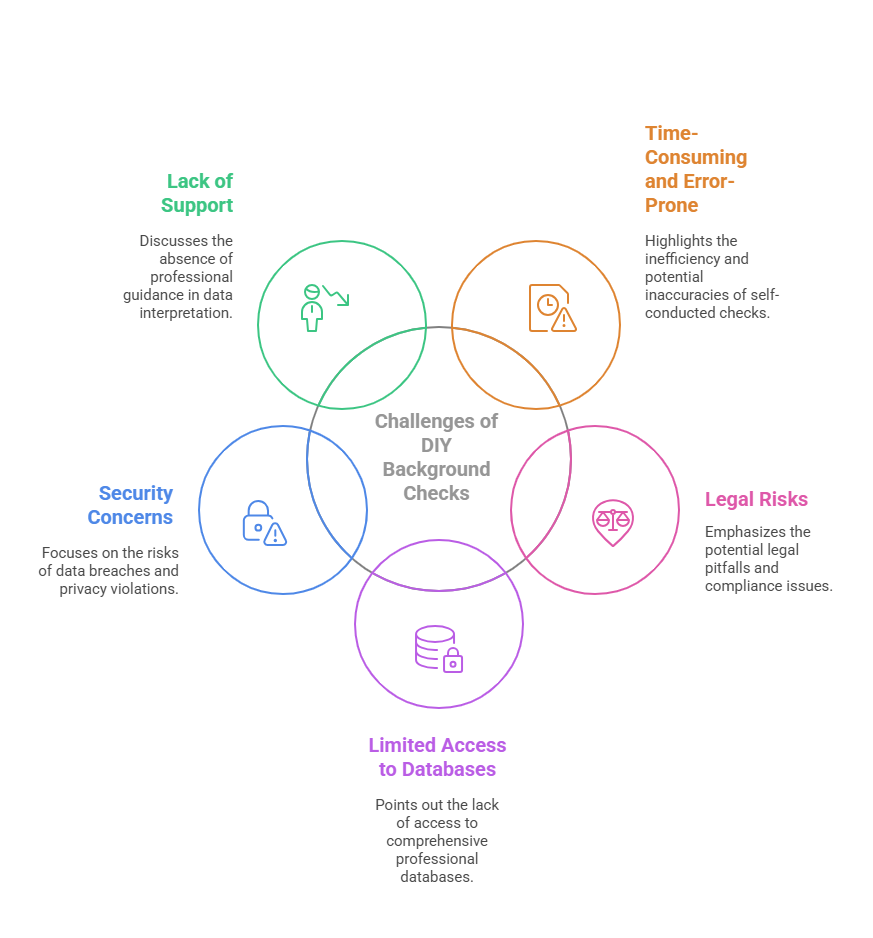
1. Time-Consuming and Error-Prone
One of the most significant drawbacks of conducting background checks yourself is the time it takes. Employers must gather information from multiple sources, ensure all details are accurate, and interpret the data on their own. This process can take weeks, and there’s a higher likelihood of errors or missing crucial information. Without access to professional databases, employers might only be able to perform basic checks, which can leave gaps in the candidate’s background.
2. Legal Risks
Employers must be cautious about legal compliance when conducting background checks independently. Failing to follow the proper procedures—such as obtaining consent from candidates or adhering to local, state, and federal laws—can result in violations. Employers risk lawsuits, penalties, and reputational damage if the process is not handled correctly. Without expert knowledge, employers may unintentionally break the law.
3. Limited Access to Databases
Conducting background checks on your own typically means you won’t have access to the same vast databases that professional providers use. Publicly available information may not provide a complete picture of a candidate’s background, which means key details—such as certain criminal records, employment history, or financial background—might be missed.
4. Security Concerns
When employers handle background checks independently, they must ensure that all data, particularly personal and sensitive information, is stored securely. Small businesses or startups might not have the necessary infrastructure to protect this data effectively, potentially exposing them to data breaches or privacy violations.
5. Lack of Support
Conducting background checks without professional assistance means that employers are on their own when interpreting the results. Misunderstanding or misinterpreting the data can lead to wrong hiring decisions, which could be costly for the business.
Why RapidhireSolutions Stands Out
RapidhireSolutions excels in addressing many of the challenges associated with conducting background checks. The company’s services offer a high level of accuracy, speed, and legal compliance, ensuring employers can make informed decisions quickly and confidently. Moreover, RapidhireSolutions guarantees thorough background checks, including access to extensive databases and the protection of sensitive candidate information.
Data Table Comparison: Self-Conducted Checks vs. Online Provider
| Feature/Service | RapidhireSolutions (✔) | Self-Conducted Checks (❌) |
|---|---|---|
| Processing Time | ✔ 1 day (24 hours) | ❌ Several days or weeks |
| Compliance with Legal Regulations | ✔ Full compliance with FCRA, GDPR, and state laws | ❌ May miss legal requirements |
| Access to Comprehensive Databases | ✔ Yes (criminal records, credit reports, etc.) | ❌ Limited access (may not access all information) |
| Security and Privacy Protections | ✔ High level of security (data encryption, secure storage) | ❌ Higher risk of data breaches |
| Expert Support for Report Interpretation | ✔ Access to expert support | ❌ No expert support |
This comparison demonstrates that while self-conducted checks may seem like an inexpensive option, they can lead to delays, errors, and legal risks. On the other hand, using a professional service like RapidhireSolutions streamlines the entire process, making it quicker, more accurate, and legally compliant.
Legal Considerations for Conducting Background Checks
When it comes to conducting background checks, there are several legal considerations that employers must keep in mind to avoid potential legal pitfalls and ensure the process is conducted fairly and legally. Whether you’re conducting the background check yourself or relying on a professional service, it’s essential to comply with various state and federal laws.
1. Compliance with the Fair Credit Reporting Act (FCRA)
The Fair Credit Reporting Act (FCRA) is a federal law that governs how background checks can be used in employment decisions. Employers must obtain written consent from candidates before performing background checks. Additionally, if an employer decides not to hire a candidate based on the results of a background check, they must provide the candidate with a copy of the report and allow them an opportunity to dispute any inaccuracies. Failure to comply with the FCRA can result in lawsuits and financial penalties.
2. General Data Protection Regulation (GDPR)
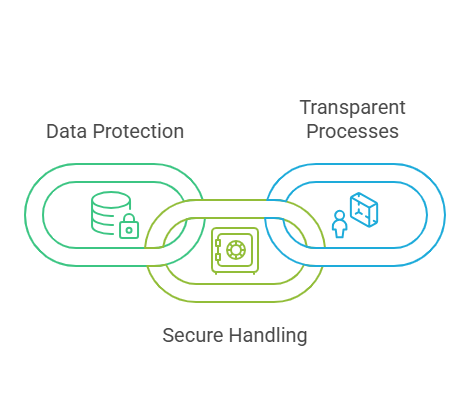
For businesses operating in or hiring from the European Union (EU), the GDPR is another important regulation to consider. This law requires employers to protect the personal data of candidates and ensures that any personal data collected during the hiring process is handled securely and transparently. Companies must ensure that they comply with GDPR standards, especially when processing data from EU residents.
3. State-Specific Regulations
In addition to federal laws like the FCRA, many states have their own specific regulations surrounding background checks. These may include restrictions on the types of information that can be considered during the hiring process, the time period during which criminal records can be used, and when background checks should be disclosed. Employers must ensure they are familiar with their state’s laws to avoid any compliance issues.
4. Candidate Privacy
The privacy of candidates is a critical concern when conducting background checks. Employers must ensure that sensitive information is stored securely and only shared with individuals who have a legitimate need to know. Mishandling of candidate information can result in data breaches and legal consequences, including reputational damage to the employer.
RapidhireSolutions ensures full compliance with all relevant laws, including FCRA, GDPR, and state-specific regulations, making it easier for employers to handle the complexities of background checks without the risk of non-compliance.
Frequently Asked Questions (FAQs)
Can I legally conduct a background check on a potential employee?
Yes, employers can legally conduct background checks, but there are specific guidelines they must follow. Employers must obtain written consent from candidates before performing a background check. They must also comply with relevant laws, such as the FCRA and state-specific regulations.
What are the risks of conducting background checks myself?
The risks include missing critical information, failing to comply with legal regulations, and handling sensitive data improperly. Additionally, the process can be time-consuming, error-prone, and less thorough than background checks performed by professionals.
How does RapidhireSolutions ensure compliance with legal standards?
RapidhireSolutions ensures compliance by adhering to all relevant laws and regulations, such as FCRA, GDPR, and state-specific hiring laws. They also follow proper procedures for obtaining consent and handling candidate data securely.
What types of background checks can I conduct through a professional provider?
Through a professional provider like RapidhireSolutions, employers can conduct a wide range of background checks, including criminal history checks, employment verification, credit reports, educational verification, and reference checks, among others.
How long does it take to get results from RapidhireSolutions?
RapidhireSolutions typically provides background check results within 24 hours, depending on the type of check being conducted and the complexity of the request.
Conclusion
In conclusion, conducting background checks is an essential part of the hiring process for employers who want to make informed decisions and mitigate the risk of hiring unqualified or dangerous candidates. While conducting background checks yourself might seem like a cost-effective solution, it often leads to delays, legal risks, and incomplete information. On the other hand, using a professional service like RapidhireSolutions ensures that the process is fast, accurate, and compliant with relevant laws, making it a better option for most employers.
By outsourcing background checks to a trusted provider, employers can save time, reduce errors, and ensure that their hiring practices are legal and secure. RapidhireSolutions excels in offering comprehensive, timely, and legally compliant background check services, helping businesses streamline their hiring process and make confident decisions.
Employers who want to avoid the headaches and risks associated with DIY background checks should consider partnering with RapidhireSolutions, a trusted name in the industry for reliable, secure, and compliant screening solutions.

